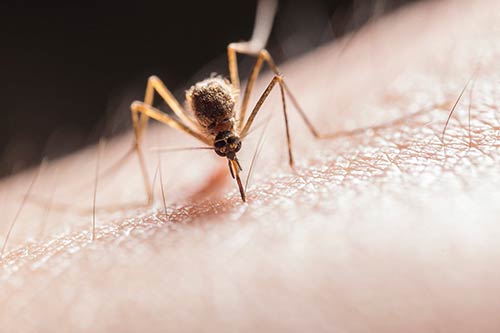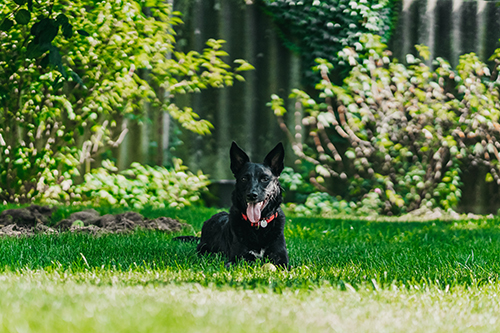FAQ

- How can I found out how much it costs to treat my yard?
- Just contact us for a free estimate. We typically can provide a quote right away.
- How long doe a treatment last?
- A treatment can last 2 to 3 weeks. The time can vary depending on uncontrollable factors such as very rainy weather.
- Do I have to be home during the treatments?
- No. We will leave you a notice when have completed a treatment.
- Will this kill all mosquitoes in my yard?
- Though it is impossible to kill all mosquitoes, the results are dramatic and you will be satisfied. All of our services include resprays if needed. These are provided within 7 to 14 days after a treatment and will not change the date of your next scheduled service.
- Do mosquitoes really cause illness?

- YES! Mosquito-borne illnesses are diseases caused by bacteria, viruses or parasites transmitted by mosquitoes. The World Health Organization estimates that those diseases kill 725,000 people yearly.
Worldwide, diseases transmitted by mosquitoes include malaria, dengue, West Nile virus, chikungunya, yellow fever, filariasis, tularemia, dirofilariasis, Japanese encephalitis, Saint Louis encephalitis, Western equine encephalitis, Eastern equine encephalitis, Venezuelan equine encephalitis, Ross River fever, Barmah Forest fever, La Crosse encephalitis, and Zika fever, as well as newly detected Keystone virus and Rift Valley fever.
In Massachusetts mosquitoes can transmit West Nile Virus (WNV) and Eastern Equine Encephalitis (EEE or “Triple E”). These are viruses that can cause illness ranging from a mild fever to more serious disease like encephalitis, meningitis and even cause death.
- What can I do to help reduce the number of mosquitoes around my home?

- Mosquitoes will breed in any puddle or standing water that lasts for more than four days. So removing anything that causes standing water is a good step.
Eliminate water-holding containers on your property.
Do not store tires outdoors as they are a common place for mosquitoes to breed.
Drill holes in the bottom of outdoor recycling containers and trash cans to let water drain out.
Clean roof gutters of leaves and debris to prevent clogging and ensure proper drainage.
Turn over plastic wading pools and wheelbarrows when not in use.
Do not allow water to stagnate in birdbaths.
Aerate and stock ornamental ponds with fish.
Keep pools clean and chlorinated and remove standing water from pool covers.
Utilize landscaping techniques to eliminate standing water.
- When can I start a program?
- You can start any time with our Pay-as-You-Go plan. However, we recommend the Seasonal Package that runs from early May to late September and provides optimal protection. An early start will assure that mosquitoes are stopped from the time larvae hatch and keep your yard pest free throughout the season.
- Will there be any unpleasant odors?
- Our 100% organic products may leave a mild scent that will disappear quickly after treatment.

- What about my kids and pets?
- We recommend children and pets stay indoors for at least 30 minutes after treatment.
- Why worry about Ticks?

- Ticks carry pathogens that can cause human disease. According to the US Center for Disease Control and Prevention (CDC), ticks have been found to cause over 15 different illnesses throughout the United States.
The most common tick-borne diseases in Massachusetts are Lyme Disease, Babesiosis, and Anaplasmosis. Other diseases that are more rare, but still occur, are Tularemia, Rocky Mountain spotted fever, Borrelia miyamotoi, and Powassan virus.
The ticks that transmit Lyme disease can occasionally transmit other tick-borne diseases as well.
Please remember that treatment for Lyme disease is more effective if begun early. If you have been bitten by a tick or are concerned you may have Lyme disease, contact your doctor right away.
- How can I prevent tick bites?

- Avoid moist and humid environments, especially wooded and grassy areas. Shrubs, tall grassy meadows, and forests can increase your chances of a tick bite. When hiking, walk in the center of the trail and avoid overhanging bushes and branches and don’t stroll through grasslands.
Wear long pants and long sleeves for extended outdoor activities. Avoid overheating by choosing light-weight, breathable fabrics. Tucking your pant legs into your socks and wearing closed-toes shoes can also help. Spray insect repellent lightly on your clothes to help repel ticks.
After being outdoors always inspect clothing, shoes, hats and any items you had with you. Remove all clothing and check your entire body, especially under the arms, in and around the ears, behind the knees, between the legs, and around the head. Don’t forget to check your pets. Wash and dry your clothing. If you don’t have time, a quick cycle in the dryer will eliminate ticks.
Shower within 2-hours of coming home to wash away ticks and reduce risk bites.
If you do notice a tick that has latched on, remove the tick using fine-tipped tweezers. Removing a tick within 24-hours highly reduces the chances of contracting Lyme disease. You should watch for symptoms and consult your doctor if show signs of a rash or fever.








